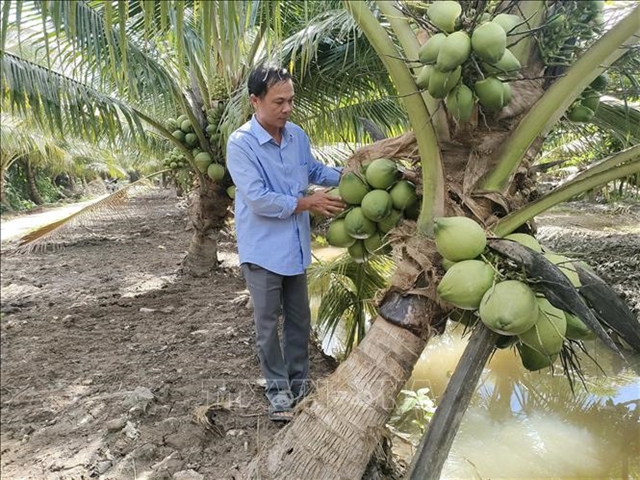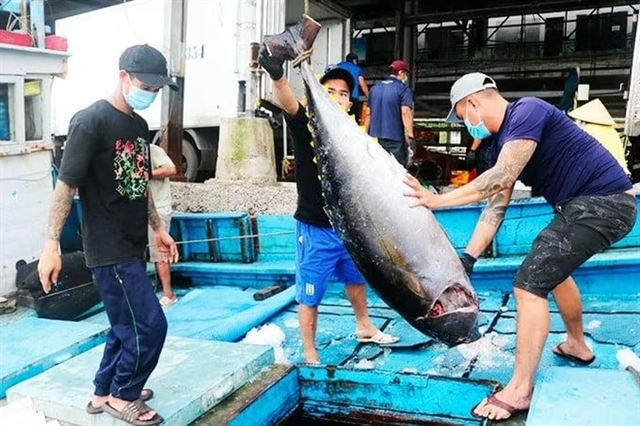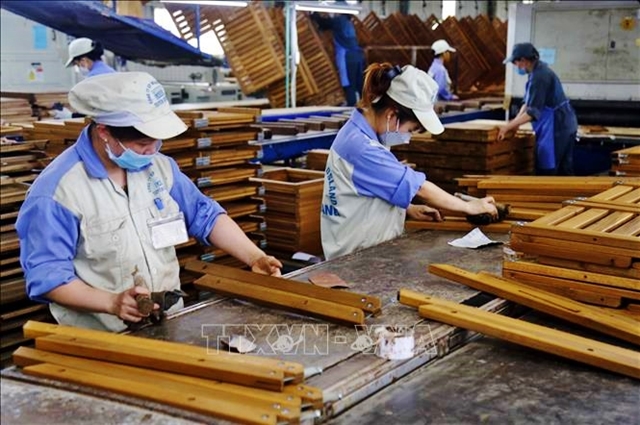 Inner Sanctum
Inner Sanctum
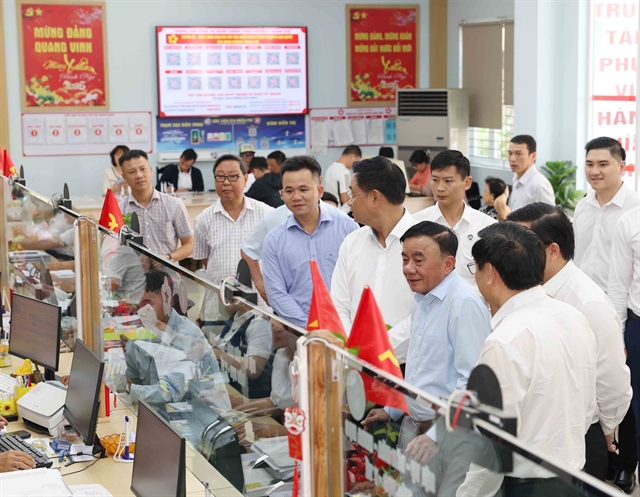
Jeremy Chua, founder of Singapore-based production company Potocol, produced Vietnamese director Phạm Thiên Ân’s 2023 film Inside the Yellow Cocoon Shell.
The film won the Camera d’Or at this year’s Cannes Film Festival and the Best Asian Feature Film prize at the Singapore International Film Festival (SGIFF) earlier this month.
At the SGIFF, Lê Hương chatted with Chua about the film and his plans to cooperate with more Vietnamese directors.
 |
| Producer Jeremy Chua. — VNS Photo Lê Hương |
Inner Sanctum: Why did you choose to work with Vietnamese director Phạm Thiên Ân on this project?
Jeremy Chua: This is our second film with Việt Nam, after Bùi Thạc Chuyên’s Glorious Ashes, which also got the Singapore Film Commission grant. So we have a history of working with Vietnamese filmmakers.
The Glorious Ashes is actually Việt Nam’s submission for Best International Feature at the 2024 Academy Awards. They submitted that one as a candidate instead of Inside the Yellow Cocoon Shell, but we were happy anyway.
I saw Ân’s film at Cannes in 2019. And the sales agents knew that I was working with a lot of Asian directors, not just Singaporeans. They invited me to watch his short film in the Director’s Fortnight section. And after the screening, we had dinner and talked about our feelings about the film, and we found that we were both drawn to similar kinds of cinema.
In particular, he said that cinema to him is more than just about narrative, but it’s also about expressing his own way of communicating with the rest of the world.
And he’s an introvert. He is someone who doesn’t express himself through talking much, but rather through cinema, so I resonated with that.
That’s normally how I choose to work with the directors. And so we agreed that evening, after watching his film, to work together on this movie.
Inner Sanctum: Are you satisfied with the film’s ticket sales so far?
Jeremy Chua: Actually, we just finished our French release. We had over 50,000 admissions, not just in Paris, but the whole country, which was very successful for a three-hour Vietnamese film in France.
We also now have a release soon in Greece, and we have a release soon in Spain and Portugal. The next big one is in January in the US with a distributor, Kino Lorber.
I think the film is going to be one that takes time to evolve in the general public — nobody thinks “I’ll watch that right away” about a three-hour Vietnamese art house film.
It’s more like when people have conversations, when critics and reviewers and industry people keep talking about a movie. Then, I think more people will have curiosity. So, we think this film will have more of a long-term distribution plan, and it will also be a good stepping stone for his next film.
I think this one also because it’s a personal film. It is really towards his own expression. We are not so stressed about the audience, we just want the film to recoup its budget and then we are quite happy. I think right now we are very close to this stage already — I think that was only two weeks ago when it was released in Việt Nam.
Inner Sanctum: Vietnamese audiences have different opinions on the film. Many praised its cinematic language while others complained about its slow pace and runtime. What do you think about it?
Jeremy Chua: I think the discussion also is about the essence of time, and how we spend our time in contemporary society. And the film also criticises our obsession with “fast food information” and the “fast food lifestyle”.
We want quick gratification. We want material things, we want to climb the social ladder. The film is a bit critical: Is this our nature? Is this what humans really are on Earth to do?
So, I kind of feel that this reaction is not unnatural because it is our instinct now that we want instant things.
And I hope people realise after some time, “Is this how I really want to live my life? Do I not appreciate my neighbours, family, travelling, and self discovery? Do I only need to live a very quick city life, or is there space for other kinds of spiritual connection with more invisible texture?”
So, I think it’s good that there’s this discussion and that naturally slow cinema is confronting audience expectations of what cinemas can do. But I think the film also is for people who have maybe encountered some kind of loss, grief, or sadness and haven’t been able to express their melancholia.
The film gives them a space to accept that some darkness can also be beautiful.
Inner Sanctum: What do you think about Vietnamese cinema in general and Vietnamese filmmakers in particular? And what do you think about the chance to further cooperate with other film directors in Việt Nam?
Jeremy Chua: I think for a long time, I’ve admired Vietnamese cinema because it's often very poetic and very lyrical.
I think the first Vietnamese film I watched was Phan Đăng Di’s Bi, Don't Be Afraid. And then I started watching Adrift.
What I found is that Vietnamese cinema has its own language, you know, that is very in tune with nature, very in tune with maybe a pre-modern way of life and beauty and simplicity. I also feel that Ân has this quality, but in a very different style.
But if you look at a lot of people in young generation, for example, they all have their own independent voices. Nothing is the same. They’re all creating different kinds of independent cinema. And at the same time there's also this very complex and robust commercial cinema.
So, I kind of think that if there's more and more of a chance for commercial and art house cinema to collaborate, the audiences will grow to really believe in Vietnamese cinema. International audiences are already getting familiar with directors like Lê Bảo and Ash Mayfair.
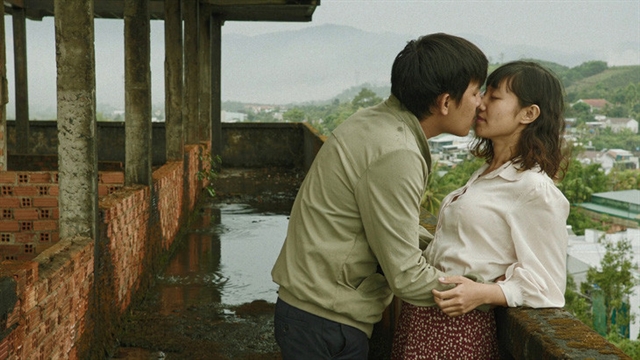 |
| A scene from the film 'Inside the Yellow Cocoon Shell'. Photo courtesy of Phạm Thiên Ân |
Inner Sanctum: Do you have any projects lined up for next year?
Jeremy Chua: I'm hoping to work with Bùi Thạc Chuyên again on his next film. I can't say too much, but it's going to be a more ambitious film. It's going to be a period piece. And right now, Ân is also writing a new script. So, at least these two projects are on our slate for next year's development and production.
Inner Sanctum: What are your thoughts on this film festival and how participating in it will impact your career?
Jeremy Chua: It keeps our industry strong, I would say.
I think the festival gives a spotlight to some unexpected films that could be culturally significant or have an impact overseas. And the festival creates this space where people can encounter these films in a setting where there are the Q&A sessions and conversations with other filmmakers about the future of cinemas.
It is a place where, if you are a cinephile and you can’t travel to, you know, Cannes or Berlin, you can come to this festival and meet with all these industry directors or important industry people. It keeps the spirit of independent film alive.
What’s also good is that when there is enough public discussion about independent films, it makes the theatres, the OTT streaming platforms, and TV channels say “Oh, people are really interested in these films,” which gives them a higher chance of being selected for programming and being purchased by an international distributor.
Right now, a lot of media are writing reviews or articles about the festival films, which gives many people in the public who might usually only watch Hollywood films a chance to know about more diverse kinds of films.
I think Hồ Chí Minh City will have a festival next year as well, which will give people another chance to encounter something different.
Inner Sanctum: How do you think investors can be enticed to back independent films?
Jeremy Chua: Sometimes you must tell investors that it’s not necessarily about the money. If you can have a film that travels, it's also good for the reputation.
The nice thing about cinema is that it lasts forever. I mean, if it's a good film, it will be a classic. People in 100 years will watch the film, and as an investor or producer your name will be on it.
Every time you pitch involvement in a more artistic film, the idea is to also tell the investors to not think about short-term recoupment. Think about the long-term influence that you can get from being involved in films with strong artistry.
And if the director becomes important or culturally significant in the future, the value of their early work grows. It's like buying a painting. You never know if the artists in 10 years will become famous, but if you love the work and believe in them and like what they do, you support it anyway.
That’s why I tell investors that I believe in the future they can be a very important part of the history of cinema. — VNS

